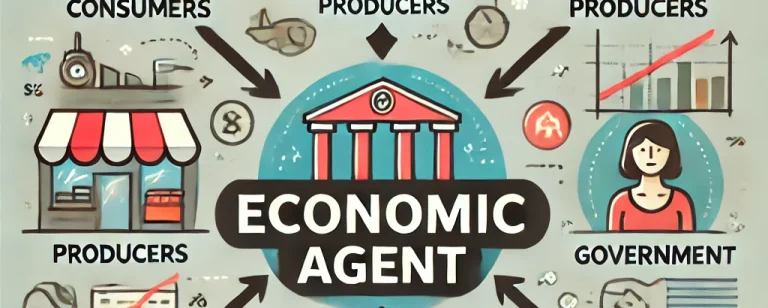Who are Economic Agents? Here is the answer, Economic agents are the main players in any economy, making decisions that determine resource allocation, production, and consumption. These agents are consumers, firms, governments, and foreign entities that interact within markets to drive economic activity. Knowing who these agents are, what their objectives are, and what functions they perform gives a better insight into how economies operate. This article delves into the roles of economic agents, types, and goals, and how they shape economic outcomes and policies.
Who Are Economic Agents?
Economic agents are the fundamental decision-makers in an economy who affect its overall functioning. They are individuals or entities that take action to fulfill their needs and wants by interacting with other economic agents.
The actions of such agents determine the allocation of resources, production, and consumption within the economy. In other words, economic agents play a very central role in influencing demand, supply, prices, and processes of production in any given economic environment.
Examples include consumers who make purchasing decisions, firms that decide what to produce, and governments that set policies.
Types of Economic Agents
There are several types of economic agents, each with unique roles and functions within the economy. Understanding these types helps in comprehending how economic decisions are made and how they affect market outcomes.
- Consumers: Consumers are individuals or households that demand goods and services. They make decisions based on their preferences, incomes, and the prices of goods. The role of the consumer is fundamental to the functioning of markets as they influence demand and thereby affect the prices and quantities of goods produced.
- Firms: Firms are the producers of goods and services. They operate with the primary goal of maximizing profits. Firms decide what to produce, in what quantities, and at what price to sell based on the market demand and available resources.
- Governments: Governments act as economic agents by making decisions related to taxation, public spending, and regulation. Their role is to ensure the smooth functioning of the economy by creating policies that regulate market activities and intervene when necessary to correct market failures.
- Foreign Entities: Foreign entities such as international organizations and foreign governments also participate in economic activities by influencing trade, investment, and economic policies. They act as economic agents by interacting with domestic consumers, firms, and governments.
Objectives of Economic Agents
Each type of economic agent has distinct objectives that guide their decision-making processes. These objectives reflect the primary goals that drive their behavior and ultimately shape economic outcomes.
Consumer’s Objectives
Consumers seek to maximize their satisfaction or utility from consuming goods and services. Their primary goal is to obtain the highest possible satisfaction relative to their income and the prices of goods.
- Utility Maximization: Consumers aim to get the greatest value from their purchases, considering their limited resources.
- Satisfaction of Needs: They seek to fulfill basic and luxury needs, which may vary across different consumers.
Firm’s Objectives
Firms, as producers, have profit maximization as their primary objective. However, they may also pursue other goals such as market share expansion, innovation, and long-term sustainability.
- Profit Maximization: The main goal of a firm is to maximize its profits through cost-effective production and strategic pricing.
- Market Dominance: Firms often aim to dominate a market, gaining competitive advantage over rivals.
- Sustainability: Some firms may prioritize environmental sustainability and corporate social responsibility.
Government’s Objectives
Governments aim to ensure economic stability, promote growth, and reduce inequalities within society. Their economic goals also include managing inflation, unemployment, and public debt.
- Economic Stability: Governments strive for macroeconomic stability, which includes controlling inflation and unemployment.
- Economic Growth: Encouraging economic growth is crucial for raising living standards.
- Wealth Redistribution: Governments often focus on redistributing wealth to reduce income inequalities.
Foreign Entities Objectives
Foreign entities, including international organizations, aim to promote trade, investment, and cooperation between countries. Their objectives are often linked to global economic stability and the promotion of sustainable development.
- International Trade Expansion: Encourage free trade agreements and cross-border exchanges.
- Sustainable Development Goals: Many foreign entities focus on global challenges such as poverty reduction and environmental protection.
Functions of Economic Agents
Economic agents perform key functions that are essential for the smooth operation of an economy. These functions include decision-making, resource allocation, and market interaction.
Consumer’s Functions
Consumers influence market demand by making purchasing decisions. Their choices drive the allocation of resources and determine what goods and services are produced.
- Demand Creation: Consumers create demand in the market, signaling to producers what to supply.
- Price Sensitivity: Consumers’ responsiveness to price changes affects supply and demand dynamics.
- Resource Allocation: By choosing where to spend their income, consumers direct resources towards goods and services they find valuable.
Firm’s Functions
Firms are the primary producers of goods and services. They engage in production, innovation, and competition to satisfy consumer needs while maximizing profits.
- Production: Firms use resources such as labor, capital, and raw materials to produce goods.
- Price Setting: Firms set prices based on market conditions, production costs, and competition.
- Innovation: Firms invest in research and development to create new products and technologies.
Government’s Functions
Governments regulate the economy by implementing policies, collecting taxes, and providing public goods and services. They also intervene in markets to correct inefficiencies or market failures.
- Regulation: Governments enforce laws that ensure fair competition, protect consumers, and regulate industries.
- Public Services: Governments provide essential services such as healthcare, education, and infrastructure.
- Market Stabilization: Governments intervene in markets to stabilize prices, promote full employment, and control inflation.
Foreign Entities Functions
Foreign entities play a vital role in cross-border trade, investment, and international relations. They help shape global markets and economic integration.
- International Trade: Foreign entities facilitate trade by creating trade agreements and promoting exports.
- Foreign Direct Investment (FDI): Foreign entities invest in local economies, boosting capital and technology flow.
- Global Cooperation: International organizations coordinate policies that address global challenges, such as climate change and economic inequality.
Conclusion
To conclude, economic agents play a key role in the workings of any economy. Consumers, firms, governments, and foreigners have different roles affecting how goods and services are produced, distributed, and consumed. Their interaction determines which particular outcome the economy takes about growth, inflation, and wealth. Understanding the roles and objectives of it helps toward a better understanding of how the economy works and how policies can be constructed to foster sustainable economic development.
Economic Agents FAQs
Who are the economic agents?
Economic agents are people or groups that make decisions on what to do with resources within an economy. They can be consumers, firms, government, and foreigners who interact through markets.
What is an economic agent?
An economic agent is anyone who makes decisions about how they will allocate their resources towards satisfying their needs or other objectives. Economic agents are thus households, firms, and governments.
Can you give some examples of economic agents?
Some examples of economic agents are consumers who demand goods, firms that produce goods and services, and governments who regulate the economy. Foreign entities also interact as economic agents.
What are the objectives of economic agents?
The objectives of economic agents are to maximize utility (consumers), maximize profit (firms), and ensure economic stability and growth (governments). It encourages trade and investment (foreign entities).
What are the functions of economic agents?
The functions of economic agents include decisions relating to resource allocation, production, consumption, regulation, and international trade, which determine economic activity.


